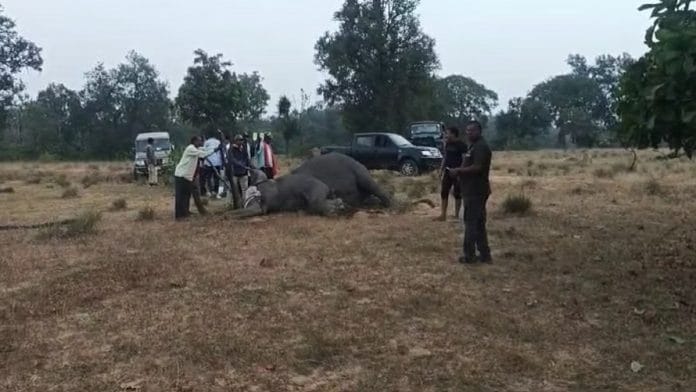New Delhi: Preliminary blood reports of the 10 elephants who died in Madhya Pradesh’s Bandhavgarh Tiger Reserve over the past week have indicated the presence of toxins, a statement issued by the environment ministry said Saturday. The ministry, however, added that an inquiry has been set up to ascertain if these toxins were accidentally ingested or were fed to the elephants following a case of human-animal conflict.
Meanwhile, a three-member team formed by Madhya Pradesh Chief Minister Mohan Yadav ruled out a conspiracy to kill the Asiatic elephants. This came after the team headed by Minister of State for Forest and Environment Dilip Ahirwar, along with Additional Chief Secretary (ACS, Forest) Ashok Barnwal, and the state’s head of forest force Aseem Shrivastava reached Bandhavgarh Saturday morning and carried out a day long investigation.
According to the environment ministry’s statement, blood samples of the dead elephants were sent to the School of Wildlife Forensic and Health (SWFH) in Madhya Pradesh’s Jabalpur on 30 October. “As per the preliminary information shared by the state government of Madhya Pradesh, the death of elephants may be because of poisoning. The final cause of death shall only be ascertained after a thorough inquiry,” it said.
On 29 October, patrolling officers of the Badhavgarh Tiger Reserve found the carcasses of four elephants in the Salkhania beat of Pataur. As they combed adjoining areas, six more elephants were found sick and unconscious. Four of the six elephants died on 30 October during treatment and the remaining two died the next day.
Centre awaits reports of 2 inquiries
An investigation had revealed that the herd of 13 elephants had consumed Kodo millet crops in a patch of land near the forest. The post-mortems of all 10 elephants were conducted by 14 wildlife veterinarians.
A senior official from the environment ministry said the MP government has constituted a five-member committee to find the exact cause of the elephants’ deaths. The team will be submitting its report to the Centre. Another team from the Wildlife Crime Control Bureau (WCCB) is also conducting an independent inquiry.
“Monitoring has been increased by the state government in the Bandhavgarh reserve and the surrounding areas to ensure that such incidents do not happen in the future,” the official added.
(Edited by Gitanjali Das)
Also Read: Bandhavgarh elephants might have eaten fungus-infected millets. How ‘kodo poisoning’ can prove fatal







Animals, no matter how wild, must not mess with humans. They should understand who is the boss and behave accordingly.
There is an absolute menace of stray dogs in Indian cities. The municipal corporations must carry out large scale culling of these stray dogs.